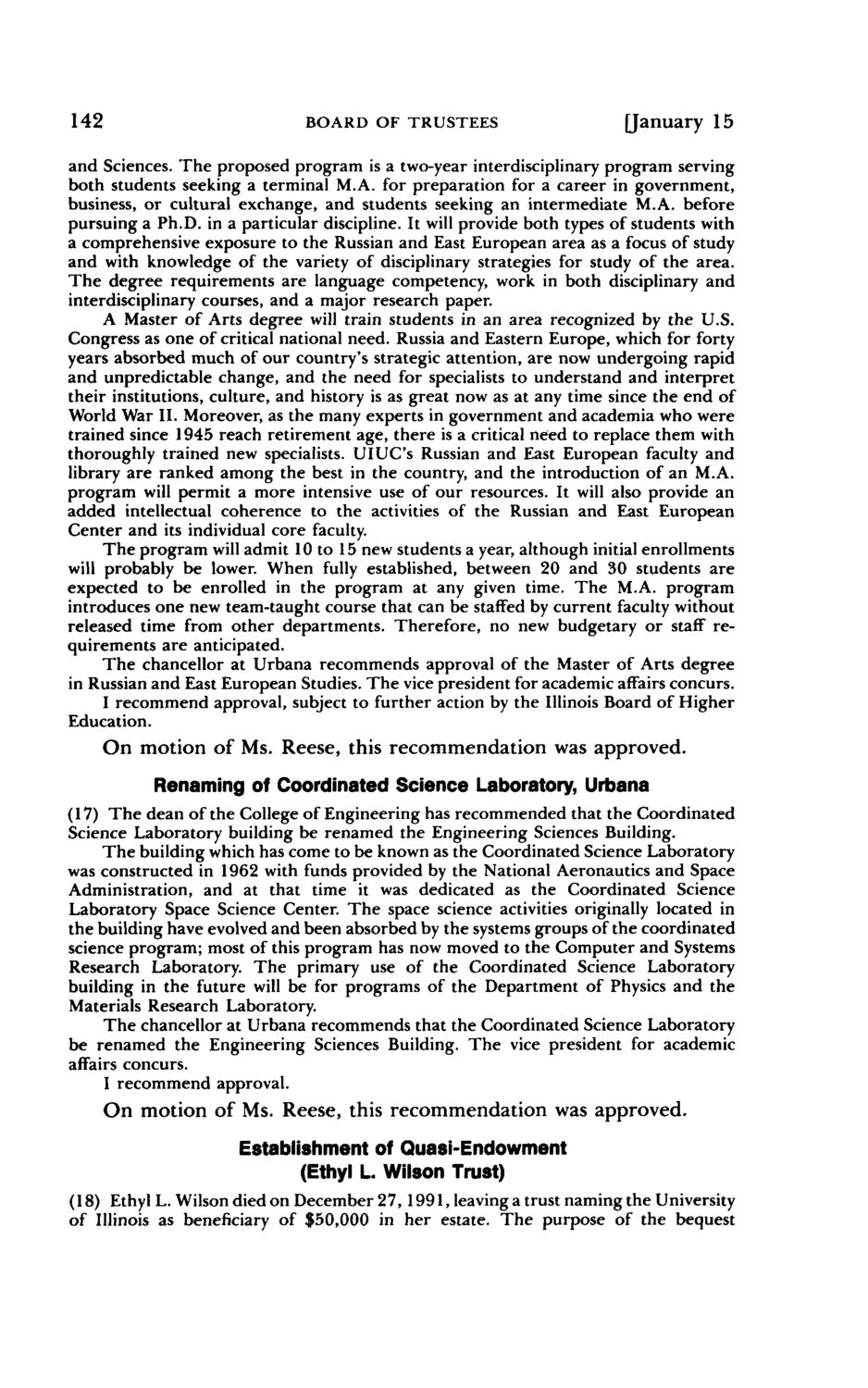| |
| |
Caption: Board of Trustees Minutes - 1992
This is a reduced-resolution page image for fast online browsing.

EXTRACTED TEXT FROM PAGE:
142 BOARD OF TRUSTEES [January 15 and Sciences. The proposed program is a two-year interdisciplinary program serving both students seeking a terminal M.A. for preparation for a career in government, business, or cultural exchange, and students seeking an intermediate M.A. before pursuing a Ph.D. in a particular discipline. It will provide both types of students with a comprehensive exposure to the Russian and East European area as a focus of study and with knowledge of the variety of disciplinary strategies for study of the area. The degree requirements are language competency, work in both disciplinary and interdisciplinary courses, and a major research paper. A Master of Arts degree will train students in an area recognized by the U.S. Congress as one of critical national need. Russia and Eastern Europe, which for forty years absorbed much of our country's strategic attention, are now undergoing rapid and unpredictable change, and the need for specialists to understand and interpret their institutions, culture, and history is as great now as at any time since the end of World War II. Moreover, as the many experts in government and academia who were trained since 1945 reach retirement age, there is a critical need to replace them with thoroughly trained new specialists. UIUC's Russian and East European faculty and library are ranked among the best in the country, and the introduction of an M.A. program will permit a more intensive use of our resources. It will also provide an added intellectual coherence to the activities of the Russian and East European Center and its individual core faculty. The program will admit 10 to 15 new students a year, although initial enrollments will probably be lower. When fully established, between 20 and 30 students are expected to be enrolled in the program at any given time. The M.A. program introduces one new team-taught course that can be staffed by current faculty without released time from other departments. Therefore, no new budgetary or staff requirements are anticipated. The chancellor at Urbana recommends approval of the Master of Arts degree in Russian and East European Studies. The vice president for academic affairs concurs. I recommend approval, subject to further action by the Illinois Board of Higher Education. On motion of Ms. Reese, this recommendation was approved. Renaming of Coordinated Science Laboratory, Urbana (17) The dean of the College of Engineering has recommended that the Coordinated Science Laboratory building be renamed the Engineering Sciences Building. The building which has come to be known as the Coordinated Science Laboratory was constructed in 1962 with funds provided by the National Aeronautics and Space Administration, and at that time it was dedicated as the Coordinated Science Laboratory Space Science Center. The space science activities originally located in the building have evolved and been absorbed by the systems groups of the coordinated science program; most of this program has now moved to the Computer and Systems Research Laboratory. The primary use of the Coordinated Science Laboratory building in the future will be for programs of the Department of Physics and the Materials Research Laboratory. The chancellor at Urbana recommends that the Coordinated Science Laboratory be renamed the Engineering Sciences Building. The vice president for academic affairs concurs. I recommend approval. On motion of Ms. Reese, this recommendation was approved. Establishment of Quasi-Endowment (Ethyl L. Wilson Trust) (18) Ethyl L. Wilson died on December 27, 1991, leaving a trust naming the University of Illinois as beneficiary of $50,000 in her estate. The purpose of the bequest
| |